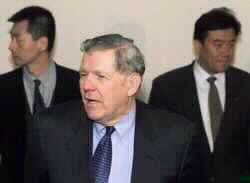The top U.S. envoy for Asia said on Thursday resolving a standoff with North Korea would be a slow process after Pyongyang poured cold water on U.S. offers of aid once suspicions about the North's nuclear intentions are cleared.James Kelly stressed global agreement that the Korean peninsula should be free of atomic weapons, a position reinforced by the imminent departure of Russian Deputy Prime Minister Alexander Losyukov for Beijing and Pyongyang.
But Kelly said after a day of "very good" talks with Chinese officials, the United States did not expect a swift solution to the impasse and he was likely to return to Beijing soon.
Kelly, U.S. Assistant Secretary of State for East Asia and the Pacific, was speaking to reporters in Beijing before heading to Singapore.
Losyukov was due to fly to Beijing later on Thursday, then onto Pyongyang to discuss Moscow's proposals for a solution to the crisis.
Mohammed ElBaradei, head of the International Atomic Energy Agency whose monitors were evicted from North Korea's nuclear plant late last month as Pyongyang announced it would take it out of mothballs, said the Losyukov visit could be key to a solution.
A Flurry of Diplomatic Activity
Capitals around Asia have buzzed with diplomatic efforts to calm the Korean peninsula as the crisis reached a head on Saturday with Pyongyang's withdrawal from the nuclear Non-Proliferation Treaty.
Washington accuses Pyongyang of developing nuclear weapons covertly, a charge the North Korea Foreign Ministry denied again on Wednesday as it continued to reject U.S. efforts to resolve the crisis.
In a major shift in his approach to North Korea since the crisis erupted, President Bush offered on Tuesday to revive a stalled initiative to give North Korea food and energy aid if it abandoned its pursuit of a nuclear arsenal.
But North Korea -- officially called the Democratic People's Republic of Korea -- scorned the offer, saying Washington was trying to trick it into disarming.
North Korea's Foreign Ministry insisted a non-aggression pact was the only way to defuse the crisis.
Iraq: Burning Issue
Washington's softer approach follows weeks of rising tension over Pyongyang's nuclear ambitions while the United States is contemplating military force to disarm Iraq, part of what Bush has termed an "axis of evil" along with North Korea and Iran.
A senior U.S. official said the Bush administration's primary concern was trying to keep the nuclear crisis with Pyongyang at bay while it prepares for war with Baghdad.
But Pyongyang has clearly not been cooperating with that strategy.
Diplomats say the United States would like China, one of Pyongyang's few allies which provides cheap grain and oil, to put more pressure on North Korea to drop its nuclear ambitions and avoid provocative moves such as missile testing.
China, which has taken a relatively balanced approach to the nuclear dilemma, offered to host talks. Still, Beijing has avoided a leading role, instead pressing both sides to negotiate.
PHOTO CAPTION
U.S. Assistant Secretary of State James Kelly talks to reporters at a Beijing hotel, January 15, 2003. China and the United States held talks on the crisis over North Korea's nuclear intentions after Washington offered to revive a program to give Pyongyang food and energy if it dropped its nuclear ambitions. (Wilson Chu/Reuter
- Author:
& News Agencies - Section:
WORLD HEADLINES


 Home
Home Discover Islam
Discover Islam Quran Recitations
Quran Recitations Lectures
Lectures
 Fatwa
Fatwa Articles
Articles Fiqh
Fiqh E-Books
E-Books Boys & Girls
Boys & Girls  Hajj Rulings
Hajj Rulings Hajj Fatwas
Hajj Fatwas














